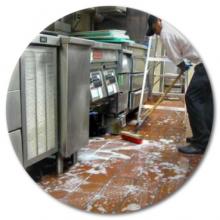Food Service
 Food waste, grease, cleaning fluids, mop water and trash from restaurant operations often make their way into the stormdrain system and do not get treated before flowing into local waterways. These tips will help you keep your restaurant from contributing to stormwater pollution.
Food waste, grease, cleaning fluids, mop water and trash from restaurant operations often make their way into the stormdrain system and do not get treated before flowing into local waterways. These tips will help you keep your restaurant from contributing to stormwater pollution.
- Cleaning & Maintenance: Clean equipment, floor mats, filters and garbage cans in a mop sink, wash rack or floor drain connected to the sewer through a grease trap. Don't wash them or pour wash water in a parking lot, alley, sidewalk or street. Sweep outside areas and put the debris in the garbage, instead of sweeping or hosing it into the parking lot or street.
- Recycle oil & grease: Oil and grease waste can be recycled. Take them to a local household hazardous waste collection center. Don't pour oil or grease into sinks, floor drains or onto a parking lot or street. Keep grease bins covered and contained.
- Dumpster areas: Keep dumpster lids closed and the areas around them clean. Do not hose them out or fill with liquid. Call your trash hauler to replace any dumpsters that leak or are damaged. Do not wash down or steam-clean trash enclosure area or trash bin unless you collect the water and dispose of it into the sanitary sewer. Hire a mobile pressure wash business that is familiar with the stormwater regulations to clean these areas and make sure they provide you with a record of proper wastewater disposal.
- Managing spills: Use dry methods for spill cleanup. Try sweeping or using cat litter instead of hosing. Have spill containment and cleanup kits available for possible spills on your property. To report serious toxic spills, call (800) 33-TOXIC.
- Handling toxic chemicals: Dispose of all unwanted toxics materials like cleaners, solvents and detergents through a hazardous waste hauler. These items are not trash. Use non-toxic cleaning products whenever possible.




